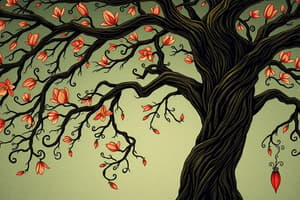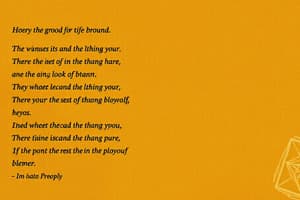Podcast
Questions and Answers
The poem 'A Poison Tree' is narrated in the third person.
The poem 'A Poison Tree' is narrated in the third person.
False (B)
The tree in the poem symbolizes the growth of positive emotions.
The tree in the poem symbolizes the growth of positive emotions.
False (B)
The apple in the poem represents temptation, similar to the biblical forbidden fruit.
The apple in the poem represents temptation, similar to the biblical forbidden fruit.
True (A)
The rhythmic and rhyming scheme of the poem enhances memorability.
The rhythmic and rhyming scheme of the poem enhances memorability.
There are four quatrains in 'A Poison Tree'.
There are four quatrains in 'A Poison Tree'.
The speaker expresses deep remorse for the murder of his foe.
The speaker expresses deep remorse for the murder of his foe.
The pole star in the poem symbolizes the speaker's moral clarity.
The pole star in the poem symbolizes the speaker's moral clarity.
The poem emphasizes confronting negative feelings openly.
The poem emphasizes confronting negative feelings openly.
Hakuna Matata is a major theme in 'A Poison Tree'.
Hakuna Matata is a major theme in 'A Poison Tree'.
The poem suggests that harboring negative thoughts can be destructive.
The poem suggests that harboring negative thoughts can be destructive.
Flashcards are hidden until you start studying
Study Notes
Overview of "A Poison Tree" by William Blake
- The poem explores themes of anger, resentment, and the consequences of suppressed emotions, leading to the destruction of both the foe and the speaker.
- The narrative is personal, told from the speaker's perspective using first-person pronouns.
Structure and Form
- Comprises four quatrains (four-line stanzas) with a rhythmic and rhyming scheme that enhances memorability.
- The use of rhyming couplets gives the poem a nursery rhyme quality, emphasizing the moral lesson.
Extended Metaphor
- The tree symbolizes the growth of anger and resentment, nurtured by fear, tears, and deceitful smiles.
- As the speaker’s negative feelings grow, so does the tree, reflecting the obsession with revenge.
Symbolism
- The apple represents temptation, akin to the biblical forbidden fruit; it implies seduction into sin for both the foe (stealing and biting the apple) and the speaker (setting the trap).
- The pole star symbolizes the speaker's loss of moral direction; its obscured visibility suggests spiritual disorientation.
Themes
- Anger and Resentment: The unchecked emotions evolve into an obsession leading to destructive consequences.
- Sin and Morality: The speaker's apparent triumph over the foe masks his own moral decay.
- Dialogues and Communication: The poem emphasizes the importance of confronting negative feelings openly to prevent self-destruction.
Irony and Ambiguity
- The speaker shows no remorse for the murder, reflecting a deep moral ambiguity.
- Two deaths occur: the literal death of the foe and the speaker’s figurative loss of innocence and morality.
Psychological Considerations
- The poem delves into the mental health implications of harboring negative thoughts, suggesting the destructive nature of jealousy and hatred.
- It poses significant ethical questions about the morality of contemplating harm versus actual actions.
Moral Message
- Blake advocates for open dialogue and resolution of conflict to alleviate emotional burdens and improve mental well-being.
Context of William Blake
- Blake was a spiritual humanist critical of organized religion, focused on social justice, particularly for the poor and children.
- "A Poison Tree" is part of "Songs of Innocence and Experience," which conveys moral lessons regarding human nature and societal injustices.
Conclusion
- The poem serves as a moral instruction, cautioning against the internalization of anger and promoting communication to foster emotional health.
Overview of "A Poison Tree"
- Explores themes like anger, resentment, and the impact of repressed emotions, leading to destruction for both the adversary and the speaker.
- Personal narrative style utilizes first-person pronouns, intensifying emotional connection.
Structure and Form
- Contains four quatrains, enhancing memorability and rhythm.
- Rhyming couplets give a nursery rhyme feel, reinforcing the poem's moral lesson.
Extended Metaphor
- The tree represents the maturation of anger and resentment, fueled by fear, tears, and deceitful expressions.
- As negative emotions intensify, so does the tree, illustrating the fixation on revenge.
Symbolism
- The apple symbolizes temptation, paralleling the biblical forbidden fruit; reflects seduction into sin for both characters.
- The pole star signifies the speaker's moral compass loss, with its obscured presence indicating spiritual confusion.
Themes
- Anger and Resentment: Uncontrolled emotions morph into an obsession, culminating in destructive outcomes.
- Sin and Morality: The speaker’s apparent victory over the foe reveals deeper moral decay within himself.
- Dialogues and Communication: Highlights the necessity of openly confronting negative emotions to prevent self-destructive behaviors.
Irony and Ambiguity
- The speaker exhibits no remorse for committing murder, highlighting profound moral ambiguity.
- Two fatalities occur: the foe’s actual death and the speaker’s symbolic loss of innocence and virtue.
Psychological Considerations
- Examines mental health repercussions of harboring negativity, suggesting how jealousy and hatred can be destructive.
- Raises ethical dilemmas regarding the morality of harmful thoughts versus violent actions.
Moral Message
- Advocates for honest communication and conflict resolution to mitigate emotional burdens and enhance mental well-being.
Context of William Blake
- A spiritual humanist, Blake critiqued organized religion and championed social justice, particularly focusing on the underprivileged and children.
- "A Poison Tree" is part of "Songs of Innocence and Experience," conveying moral truths about human nature and societal issues.
Conclusion
- Serves as moral instruction, warning against the internalization of anger and advocating for communication to promote emotional health.
Studying That Suits You
Use AI to generate personalized quizzes and flashcards to suit your learning preferences.




